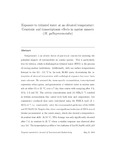Exposure to tritiated water at an elevated temperature: Genotoxic and transcriptomic effects in marine mussels (M. galloprovincialis).
| dc.contributor.author | Dallas, LJ | |
| dc.contributor.author | Bean, TP | |
| dc.contributor.author | Turner, Andrew | |
| dc.contributor.author | Lyons, BP | |
| dc.contributor.author | Jha, Awadhesh | |
| dc.date.accessioned | 2016-08-22T11:17:04Z | |
| dc.date.issued | 2016-11-01 | |
| dc.identifier.issn | 0265-931X | |
| dc.identifier.issn | 1879-1700 | |
| dc.identifier.uri | http://hdl.handle.net/10026.1/5355 | |
| dc.description.abstract |
Temperature is an abiotic factor of particular concern for assessing the potential impacts of radionuclides on marine species. This is particularly true for tritium, which is discharged as tritiated water (HTO) in the process of cooling nuclear institutions. Additionally, with sea surface temperatures forecast to rise 0.5 - 3.5 C in the next 30-100 years, determining the interaction of elevated temperature with radiological exposure has never been more relevant. We assessed the tissue-specific accumulation, transcriptional expression of key genes, and genotoxicity of tritiated water to marine mussels at either 15 or 25 C, over a 7 day time course with sampling after 1 h, 12 h, 3 d and 7d. The activity concentration used (15 MBq L-1) resulted in tritium accumulation that varied with both time and temperature, but consistently produced dose rates (calculated using the ERICA tool) of <20 Gy h-1, i.e. considerably below the recommended guidelines of the IAEA and EURATOM. Despite this, there was significant induction of DNA strand breaks (as measured by the comet assay), which also showed a temperature-dependent time shift. At 15 C, DNA damage was only significantly elevated after 7 d, in contrast to 25 C where a similar response was observed after only 3 d. The transcription profiles of two isoforms of hsp70, hsp90, mt20, p53 and rad51 indicated potential mechanisms behind this temperature-induced acceleration of genotoxicity, which may be the result of compromised defence. Specifically, genes involved in protein folding, DNA double strand break repair and cell cycle checkpoint control were upregulated after 3 d HTO exposure at 15 C, but significantly downregulated when the same exposure occurred at 25 C. This study is the first to investigate temperature efects on radiation-induced genotoxicity in an ecologically relevant marine invertebrate, Mytilus galloprovincialis. From an ecological perspective, our study suggests that mussels (or similar marine species) exposed to increased temperature and HTO may have a compromised ability to defend against genotoxic stress. Abbreviations: HTO, tritiated water; Fpg, formamidopyrimidine glyco- sylase; GoI, gene of interest; LSC, liquid scintillation counting; tDAC, tissue dry activity concentration; TFWT, tissue free water tritium; tTAC, tissue total activity concentration; woTAC, whole organism total activity concentration. | |
| dc.format.extent | 325-336 | |
| dc.format.medium | Print-Electronic | |
| dc.language | en | |
| dc.language.iso | en | |
| dc.publisher | Elsevier | |
| dc.subject | comet assay | |
| dc.subject | gene expression | |
| dc.subject | temperature | |
| dc.subject | mussels | |
| dc.subject | Mytilus | |
| dc.subject | tritium | |
| dc.title | Exposure to tritiated water at an elevated temperature: Genotoxic and transcriptomic effects in marine mussels (M. galloprovincialis). | |
| dc.type | journal-article | |
| dc.type | Journal Article | |
| plymouth.author-url | https://www.webofscience.com/api/gateway?GWVersion=2&SrcApp=PARTNER_APP&SrcAuth=LinksAMR&KeyUT=WOS:000390507800037&DestLinkType=FullRecord&DestApp=ALL_WOS&UsrCustomerID=11bb513d99f797142bcfeffcc58ea008 | |
| plymouth.volume | 164 | |
| plymouth.publication-status | Published | |
| plymouth.journal | Journal of Environmental Radioactivity | |
| dc.identifier.doi | 10.1016/j.jenvrad.2016.07.034 | |
| plymouth.organisational-group | /Plymouth | |
| plymouth.organisational-group | /Plymouth/Admin Group - REF | |
| plymouth.organisational-group | /Plymouth/Admin Group - REF/REF Admin Group - FoSE | |
| plymouth.organisational-group | /Plymouth/Faculty of Science and Engineering | |
| plymouth.organisational-group | /Plymouth/Faculty of Science and Engineering/School of Biological and Marine Sciences | |
| plymouth.organisational-group | /Plymouth/Faculty of Science and Engineering/School of Geography, Earth and Environmental Sciences | |
| plymouth.organisational-group | /Plymouth/REF 2021 Researchers by UoA | |
| plymouth.organisational-group | /Plymouth/REF 2021 Researchers by UoA/UoA06 Agriculture, Veterinary and Food Science | |
| plymouth.organisational-group | /Plymouth/REF 2021 Researchers by UoA/UoA07 Earth Systems and Environmental Sciences | |
| plymouth.organisational-group | /Plymouth/Research Groups | |
| plymouth.organisational-group | /Plymouth/Research Groups/BEACh | |
| plymouth.organisational-group | /Plymouth/Research Groups/Marine Institute | |
| plymouth.organisational-group | /Plymouth/Users by role | |
| plymouth.organisational-group | /Plymouth/Users by role/Academics | |
| plymouth.organisational-group | /Plymouth/Users by role/Researchers in ResearchFish submission | |
| dc.publisher.place | England | |
| dcterms.dateAccepted | 2016-07-27 | |
| dc.rights.embargodate | 2017-8-21 | |
| dc.identifier.eissn | 1879-1700 | |
| dc.rights.embargoperiod | 12 months | |
| rioxxterms.versionofrecord | 10.1016/j.jenvrad.2016.07.034 | |
| rioxxterms.licenseref.uri | http://www.rioxx.net/licenses/under-embargo-all-rights-reserved | |
| rioxxterms.licenseref.startdate | 2016-11-01 | |
| rioxxterms.type | Journal Article/Review |


